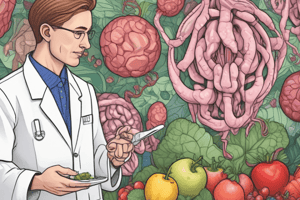Podcast
Questions and Answers
What is the primary function of the large intestine in terms of water absorption?
What is the primary function of the large intestine in terms of water absorption?
The primary function of the large intestine is to absorb water and electrolytes from the indigestible remainings.
Describe the process of formation of faeces in the large intestine.
Describe the process of formation of faeces in the large intestine.
The formation of faeces occurs in the large intestine, where water and electrolytes are absorbed, leaving behind a semi-solid waste material.
What is a balanced diet, and why is it essential for maintaining good health?
What is a balanced diet, and why is it essential for maintaining good health?
A balanced diet is a diet that provides the body with the necessary nutrients, vitamins, and minerals in the right proportions, and it is essential for maintaining good health because it provides the body with the necessary energy and nutrients to function properly.
How does the large intestine contribute to the formation of a balanced diet?
How does the large intestine contribute to the formation of a balanced diet?
What is the significance of vitamin C in a balanced diet?
What is the significance of vitamin C in a balanced diet?
Why is it essential to modify diets for individuals with certain health conditions, such as diabetes mellitus?
Why is it essential to modify diets for individuals with certain health conditions, such as diabetes mellitus?
What is the primary goal of modifying diet for cancer patients undergoing treatment?
What is the primary goal of modifying diet for cancer patients undergoing treatment?
What is the purpose of a gastric bypass surgery in obese individuals?
What is the purpose of a gastric bypass surgery in obese individuals?
What is the importance of a high-fibre diet in the defaecation process?
What is the importance of a high-fibre diet in the defaecation process?
What are some of the short-term side effects of gastric bypass surgery?
What are some of the short-term side effects of gastric bypass surgery?
What is the role of a balanced diet in maintaining overall health?
What is the role of a balanced diet in maintaining overall health?
What is the consequence of a low-fibre diet on the digestive system?
What is the consequence of a low-fibre diet on the digestive system?
What is the primary cause of obesity?
What is the primary cause of obesity?
What are the recommended dietary changes for obese individuals?
What are the recommended dietary changes for obese individuals?
What is the role of nutritionists in promoting healthy diets?
What is the role of nutritionists in promoting healthy diets?
What is the significance of Pinggan Sihat Malaysia?
What is the significance of Pinggan Sihat Malaysia?
What are the health risks associated with excessive intake of saturated fats?
What are the health risks associated with excessive intake of saturated fats?
What is the importance of meal planning for individuals with specific health conditions?
What is the importance of meal planning for individuals with specific health conditions?
Flashcards are hidden until you start studying
Study Notes
Nutrition and the Human Digestive System
- Food can be designed to meet the nutritional needs of humans.
- The human digestive system consists of structural components that work together to digest and absorb nutrients.
Digestion
- There are two types of digestion: physical digestion and chemical digestion.
- Carbohydrate digestion occurs in the mouth, where salivary amylase breaks down starch into maltose.
- Protein digestion occurs in the stomach, where pepsin breaks down proteins into peptides and amino acids.
- In the small intestine, carbohydrates, proteins, and lipids are further broken down into simple sugars, amino acids, and fatty acids, respectively.
Absorption
- The structure of a villus in the ileum allows for efficient absorption of digested nutrients.
- The ileum and villus are adapted for absorption, with a large surface area and rich blood supply.
Assimilation
- The circulatory system plays a crucial role in assimilating digested nutrients.
- The liver metabolizes carbohydrates and proteins, stores nutrients, and detoxifies harmful substances.
Defaecation
- The large intestine absorbs water and vitamins, and forms faeces.
- A diet high in fibre can prevent health problems such as constipation, colon cancer, and haemorrhoids.
Balanced Diet
- A balanced diet should include a variety of food groups in the right proportions, as illustrated by the Pinggan Sihat Malaysia.
- Excessive intake of saturated fats can lead to health problems such as obesity and cardiovascular diseases.
Health Issues Related to Digestive System and Eating Habits
- Obesity is a growing health issue worldwide, which can be controlled through diet management and exercise.
- Surgical procedures such as gastric bypass can be necessary in some cases, but have short- and long-term side effects.
- Modifying digestive organs can have significant effects on human health.
- Eating habits can contribute to health issues such as cancer, diabetes, and cardiovascular diseases.
Studying That Suits You
Use AI to generate personalized quizzes and flashcards to suit your learning preferences.




